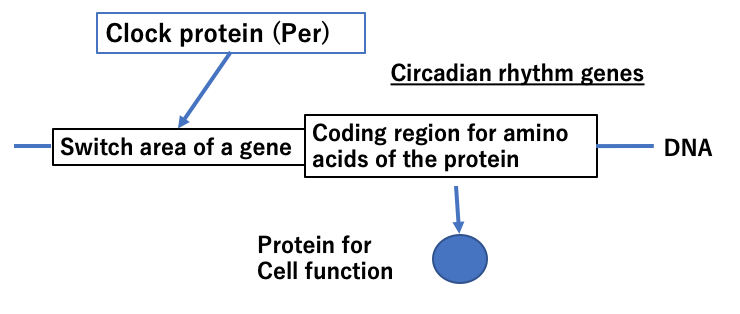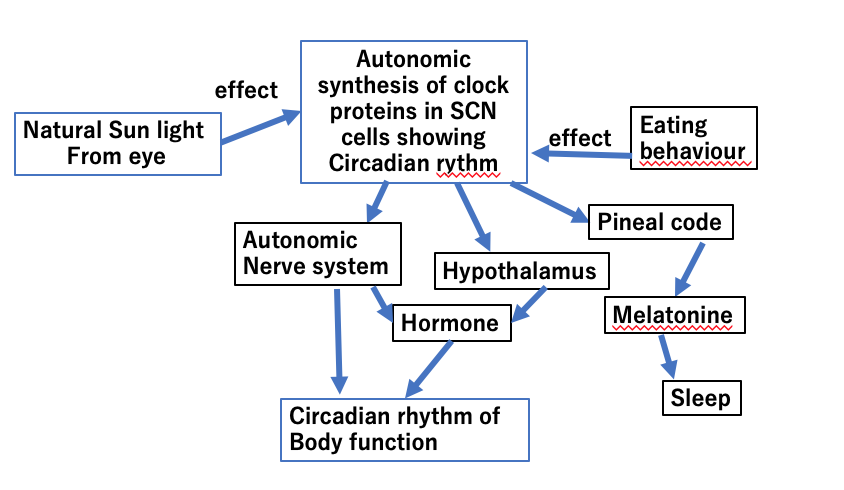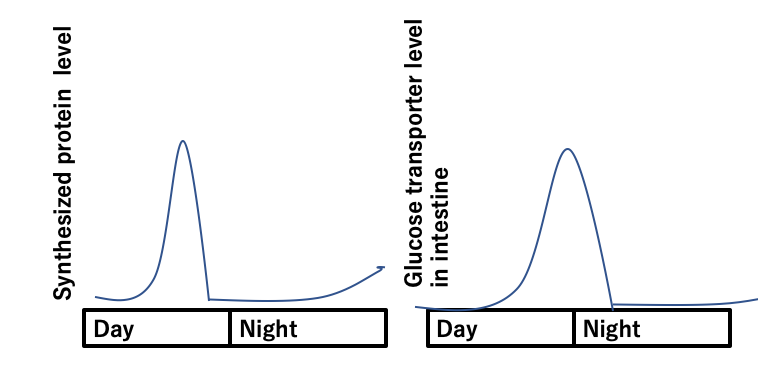
Spring has come now. What is your internal clock?
Now spring has come to Awaji. Everybody here is excited to see cherry blossoms and feel warm wind across the island. A flower festival has started at Akashi Channel National Government Park since March 19th. Not only us but birds and insects may feel happiness at the start of spring. Because all living organisms on earth have similar internal clock systems to catch up with external environmental changes. Here, let’s see this clock system inside of our body.
When you move to USA from Japan, you may feel a time lag usually and then cannot sleep well at night. This is well known as a jet lag because we have an internal clock system based on the length of a day called circadian rhythm. According to this system, we feel a change of day and night automatically. It is also known that insects and birds feel seasonal changes automatically based on their internal clock systems. Using an insect as a model animal, a gene causing the circadian rhythm has been identified. When a gene was disrupted artificially within the insect, it lost the rhythm. This gene is named Per (period) contributing for the clock in the insect as well as in our bodies (Fig.1). Three US researchers who found the gene were awarded the Nobel Prize of Medicine and Physiology in 2017. A protein produced based on the gene plays the role of a clock within our bodies. The protein-expression level itself repeats high and low in 24 hrs within cells of our body. A molecular mechanism of this repetition has been clarified in detail. This protein plays a role as a switch to start and stop of production of the coding protein by binding to a specific DNA area of the Per gene itself (Fig. 1).

What are the target genes of the switch besides Per? At night, we become sleepy and then in the morning we wake up. This is a typical reflection of the circadian rhythm. For this rhythm, a hormone called melatonin plays an essential role for sleep which is produced in the pineal body in our brain and then circulates in our blood. Switching of the gene for melatonin synthase is controlled by the clock protein. In the morning heartbeats and then circulation of blood increase. This is because melatonin synthesis decreases in the morning and then hormones like adrenalin increase to supply glucose in our body for our activities. Hormonal control by melatonin and adrenalin under the clock system is brought about by our autonomic nerve system (Fig. 2).

The autonomic nerve system is centralized at the hypothalamus located deep in our brains. Concentration of blood glucose, body temperature, blood pressure and several other essential body conditions are detected by the hypothalamus and these conditions are maintained at a constant level through a system of the autonomic nerve system and hormones. In an anterior part of the hypothalamus, an area called suprachiasmatic nucleus (SNC) exits close to the crossing point of two nerves from the right and left eyes. In this SNC where about 20,000 neuronal cells work as the center of the clock (master clock) in which every cells have several clock proteins including Per and oscillate the circadian rhythm. The signal of this rhythm is sent to all of the cells in our body through the autonomic nerve cell system from the hypothalamus. In all of our cells, the clock proteins and system exist as well and are named local clock. This local clock is controlled by a signal from the master clock in SNC. For instance, expression of a cell-membrane integrated protein for transport of glucose in the intestine to blood vessels is controlled daily by the local clock protein. Its synthesis is highest at nightfall. Therefore, glucose intake is more efficient at the beginning of the evening than morning (Fig. 3).

Recently, a guidebook of internal clock dependent nutrition (in Japanese by Dr. Shigenobu Shibata (Kyushyu Univ. School of Pharmaceutical Sciences), Blue Backs series, Kohdansya Publishing Co., 2021) has been published. In the book the author underlines importance of meal timing to avoid life-style dependent syndromes including hypertension, high blood glucose level and also aging. Prof. T. Gohda and his group (Shizuoka Prefectural Univ., School of Neutrition) study the molecular basis of oscillation of gene expression in intestines. In the book and the study, it is shown that our body clock is affected by intensity of light from outside of our body and food intake. For instance, when you feed a mouse under a natural sun light condition and give foods during the daytime alone, glucose transporting proteins of intestinal cell-membranes are synthesized during the daytime but not at night. For the mouse nighttime is best for their activity and synthesis of the glucose transporting protein naturally.
We usually recover from jet lag described above within two or three days. This also indicates that our internal clock is affected by environmental conditions. Such effect on the internal clock, especially the light effect is observed for only after appearance of mammalian in the evolutionary process. A special protein named Melanopsin in the retinal membranes receives light and then change its molecular structure, leading to release of neuronal signal transmitter glutamine. This glutamine binds to SNC cells and causes the change of rhythm by the clock proteins. This phenomenon suggests that looking at blue light from your smartphone before sleep is not suitable for better sleep, because it disturbs regular circadian rhythm.
Dr. S. Sukumaran and his colleagues at State University of New York, School of Biological Sciences even study correlation of our body clock and cause of cancer (Circadian rhythms in gene expression; Relationship to physiology, disease, drug disposition. Adv. Drug Deliv. Rev (2010)62, p914-917). According to their study, the rhythm caused by the internal clock is also involved in the control of cell division, leading to that disturbance of the rhythm which may cause cancer. Keeping circadian rhythm in a good condition may be very good for your life as everybody realizes.
